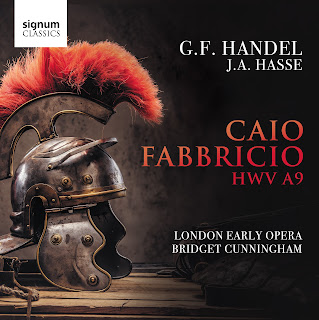When the Royal Academy of Music was founded in 1719, it had been the creation of a group of aristocrats who engaged a selection of distinguished composers to write work for the company. This meant that Handel shared his workload with other composers. But by the 1730s, things had got more acrimonious and Handel ended up with his own company with a rival company taking the majority of singers. So when he opened his Season at the King's Theatre in December 1733, he had an almost entirely new company and was solely responsible for the repertoire. He also had another company to compete with, so had to give the audience novelties. The 1733/34 season would include the premiere of his opera Arianna in Creta, but the season began with Caio Fabriccio, a pasticcio based on Hasse's opera of the same name which had premiered in Rome in January 1732.
Handel had acquired a songbook of the arias in it from his friend and favoured librettist Charles Jennens, who had earlier received it from the traveller Edward Holdsworth. This Handel used as the framework for his new pasticcio opera, into which he introduced several substitute arias besides adding shorter, more dramatic recitatives. The changes arose from a variety of reasons. The cast available to Handel was different to that which premiered Hasse's opera, and some late changes meant that arias from other sources were flown in, added to which Handel allowed singers to include their suitcase arias, the arias that they carried around with them and which they considered showed off their voices to the best. Also, in an age when singers had to learn vast quantities of new music, having a few familiar arias at the ready must have been most helpful. And London audiences did not like vast quantities of recitative so the new ones (it is unlikely Handel had access to Hasse's originals) were shorter and more incisive.
But using Hasse's arias from the opera and arias from other operas by Hasse plus music by Leonardo Vinci, Antonio Pollarolo, Francesco Corselli, Tomaso Albinoni, Giuseppe Sellito, Leonardo Leo and Francesco Ciampi, Handel created a new, composite work. Significantly, there are no arias by Handel, he gave the floor to the younger generation and kept his contribution to the recitatives and to the editorial. And before we dismiss such an assemblage out of hand, it should be remembered that composers like Vivaldi produced pasticcio operas of their own work. It was an accepted form.
We are only just beginning to appreciate Handel's pasticcios, and the latest project to bring them to light is Bridget Cunningham and London Early Opera's performance and recording of Caio Fabriccio. London Early Opera raised funds to have the conducting score of Caio Fabriccio (in Staats- und Universitätsbibliothek, Hamburg) digitised and edited into a modern edition. Additionally, scholarship has resulted in a full knowledge of the diverse provenance of its arias.
Bridget Cunningham and London Early Opera recorded Caio Fabriccio last September (2021) with Fleur Barron, Morgan Pearse, Miriam Allen, Anna Gorbachyova-Ogilvie, Hannah Poulsom, Helen Charlston and Jess Dandy and the recording is being issued by Signum Classics on 3 June 2022.
The company will be giving the work's modern premiered at St George's Hanover Square on 24 May 2022, tickets from EventBrite.


.jpg)









No comments:
Post a Comment